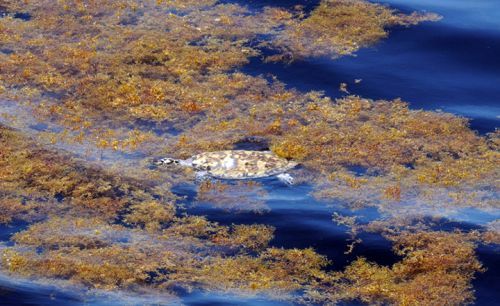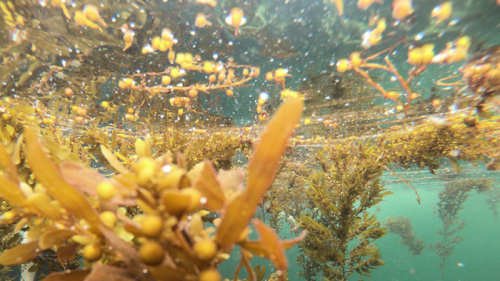Oil Spills and Pelagic Sargassum: Planning and Response Considerations
The report, Oil Spills and Pelagic Sargassum, is intended to assist those who work in oil spill response and planning where pelagic (open ocean) Sargassum is at risk from, or may interact with, oil spills.
Download the Report: Oil Spills and Pelagic Sargassum: Planning and Response Considerations [PDF, 5.3 MB]. Published July 2023.
Sargassum is a floating macroalgae or seaweed primarily found in the Caribbean, Gulf of America (formerly Gulf of Mexico), and South Atlantic regions (in U.S. waters). Sargassum occurs at the ocean surface and aggregates into offshore drift lines and patches that are important habitat for wildlife and fisheries resources.
Sargassum can also be important when it strands onshore, positively influencing beach geomorphology, ecology, and wildlife. However, large Sargassum blooms in recent years have resulted in mass stranding events that can have negative environmental and socioeconomic impacts. Periodic large Sargassum blooms or influx events are linked to global climate and ecosystem change, and further heighten the need to examine oil spill preparedness and response considerations for this resource, due to increased abundance and the interaction of multiple stressors.
By understanding the basics of the ecology of Sargassum, learning from past oil spills and responses, and incorporating other recent information on Sargassum blooms or influx events, we can better plan for, protect, and make appropriate decisions for how to respond to future oil spills.
Oil Spills and Pelagic Sargassum is the fifth in a series of spill response publications prepared by NOAA's Office of Response and Restoration. Other publications in the series can be accessed through the blue navigation bar at the page top. The report was funded by the NOAA OR&R Disaster Preparedness Program through a Lagniappe Grant award to the NOAA OR&R Emergency Response Division.
More Information about Sargassum
OR&R Supporting Response to Sargassum in St. Croix, U.S. Virgin Islands: In July 2022, NOAA scientific support was requested by the Federal Emergency Management Agency for a declared emergency on the island of St. Croix in the U.S. Virgin Islands. An unusually large influx of Sargassum on the island’s shores had begun affecting the desalination plant that is St. Croix’s primary source of water.
On Sea Turtles, Seaweed, and Oil Spills, June 16, 2020; adapted from OR&R's 2015 blog, What Happens When Oil Spills Meet Massive Islands of Seaweed?
NOAA Ocean Exploration:
 An official website of the United States government.
An official website of the United States government. 

